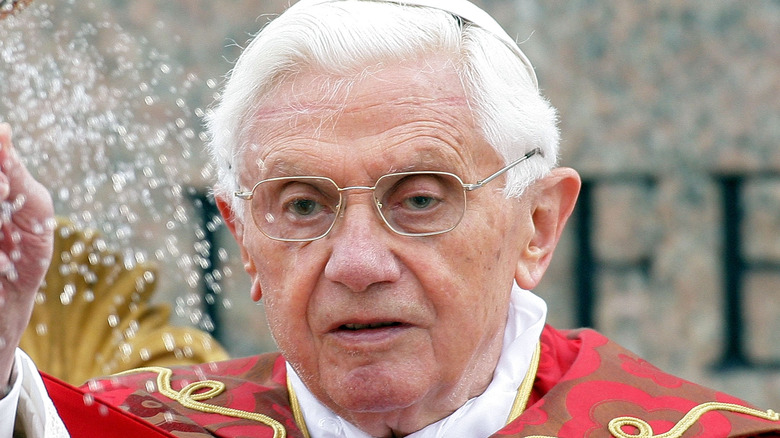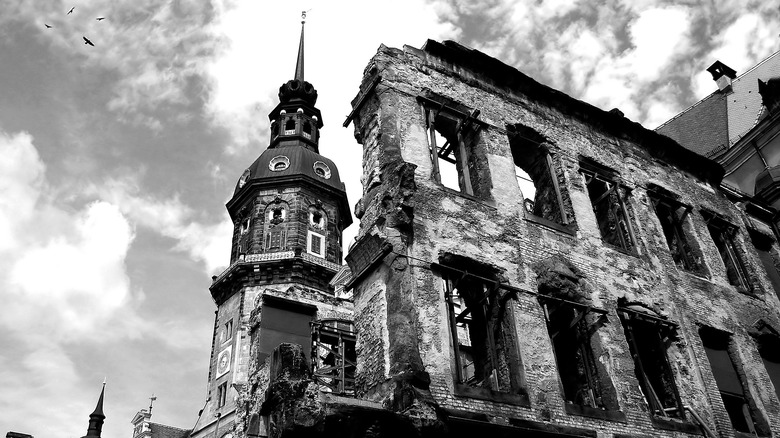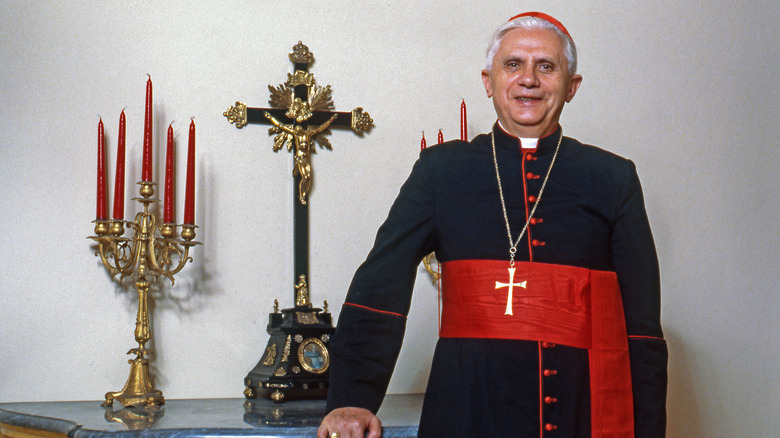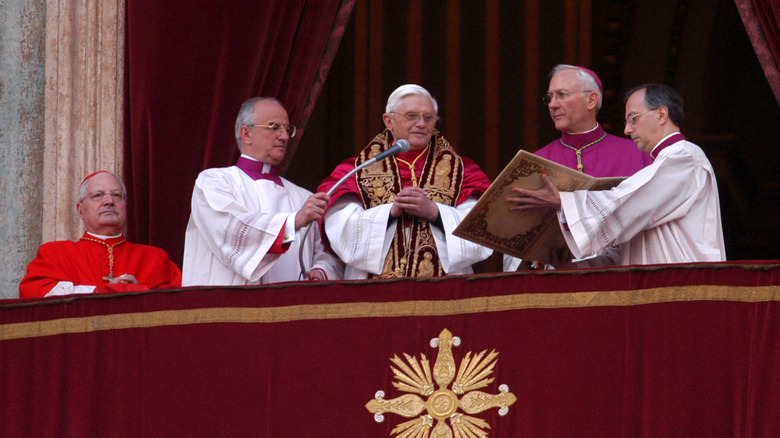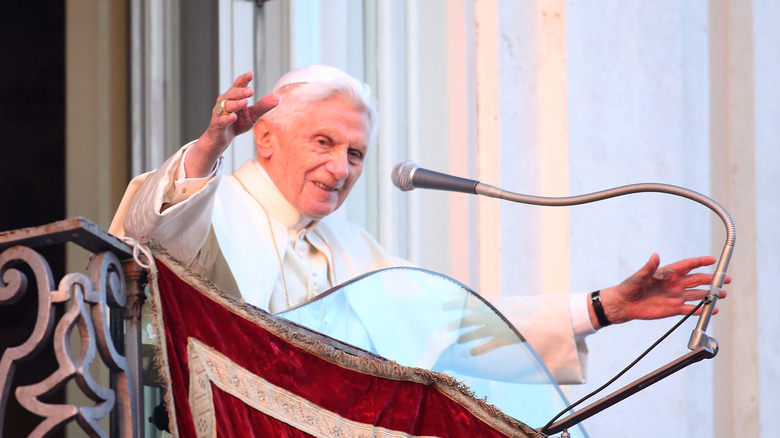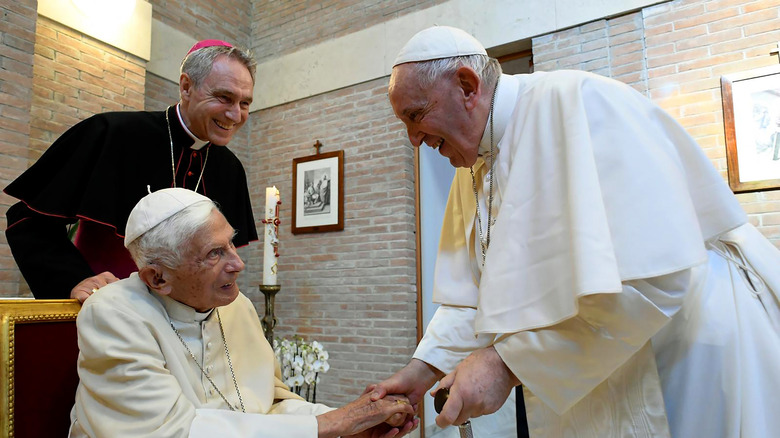The Death Of Former Pope Benedict XVI Explained
Former Pope Benedict XVI died. He was 95. Pope Benedict, who served as the leader of the Catholic Church from 2005 to 2013, had been in poor health as of late (via ABC).
A statement from the Director of the Holy See's press office, Matteo Bruni, said, "With sorrow I inform you that the Pope Emeritus, Benedict XVI, passed away today at 9:34 in the Ecclesiae Monastery in the Vatican. Further information will be provided as soon as possible."
A statement from Westminster Abbey reads, "We are deeply saddened to hear of the death of His Holiness Pope Benedict XVI. In 2010 he became the first Pope to visit the Abbey in its thousand-year history when he attended a service and prayed at the Shrine of St Edward the Confessor during his State Visit to the UK."
Pope Benedict came of age in Germany during World War II
Pope Benedict XVI was born Joseph Alois Ratzinger in Germany on April 16, 1927, to a hotel cook and a police officer, per Britannica. He grew up in a small town called Traunstein near the border of Austria, alongside an older brother, Georg, both of whom studied music under the approving eye of their devoutly Catholic parents, according to NPR. Young Ratzinger developed a lifelong love of the composer Mozart, of which he remarked in his book "Salt of the Earth": "His music still touches me very deeply, because it is so luminous and yet at the same time so deep. His music is by no means just entertainment; it contains the whole tragedy of human existence."
Growing up in wartime Germany, the future pope learned something about human tragedy. According to Britannica, Ratzinger was 6 years old when the Nazi regime rose to power in his home country. He first joined the seminary in 1939, and joined the Hitler Youth in 1941 before being drafted into the German military to join the war effort in 1943. Two years later, in 1945 he defected but was captured by American troops and held prisoner for a time. The war ended that same year and Ratzinger continued his higher education at the University of Munich in 1946 where he studied theology and philosophy before being ordained into the priesthood in 1951, per the Vatican's website.
'God's Rottweiler'
After Joseph Ratzinger became a priest, he continued a life in academia, earning a doctorate in theology in 1953. A few years later, he became a professor teaching in various German locations at the higher school of philosophy and theology, focusing on the subject of dogma and fundamental theology through 1969, per the Vatican. That year he moved to the University of Regensburg to teach dogmatic theology and the history of dogma before becoming the vice president at the university.
According to Britannica, early on in his ecclesiastical career, the man who would become Pope Benedict XVI was among the more progressive thinkers in his peer group, but over the years his views changed and he evolved into a more conservative-minded clergyman. In part, that change of heart was inspired by student protests he saw in the late 1960s while working at Tübingen in which some renounced Christianity. The effort of the protestors to deconstruct, ironically, the dogma of the Christian faith and other societal norms led to Ratzinger changing his worldview.
Per the National Catholic Reporter, in the years he served as the Prefect of the Congregation for the Doctrine of the Faith, where he was appointed by then-Pope John Paul, to whom he was a close advisor from 1978 to 2005, Ratzinger spoke out against progressive issues including "secularization, liberation theology, radical feminism, homosexuality, religious pluralism, and bioethics." He earned the nickname "God's Rottweiler."
Cardinal Joseph Ratzinger becomes Pope Benedict XVI
In 2005, Cardinal Joseph Ratzinger was elected to be the next pope after the death of Pope John Paul in April of that year. He took the name of Pope Benedict XVI. According to the Vatican, Benedict became the "265th Pontiff of the Roman Catholic Church." At 78, he was also the oldest man to be elected pope since Pope Clement XII in 1730, per Britannica. Upon taking the role, he promised to uphold longstanding Catholic ideals including issues around sexuality for both the congregation and the clergy members, of which celibacy is expected. He also hoped to inspire a new invigoration in Europe towards Catholicism and wanted to work towards better alliances with leaders of Judaism and Islam.
By the time Benedict became pope, the Catholic sex abuse scandal — in which members of the clergy around the world were accused of sexually abusing children — was rampant. In 2008, Pope Benedict visited the U.S. for the first time as pope, and in a speech at the United Nations, he denounced the abuse at the hands of priests, but by 2010, cases in Europe, and particularly Germany, came to light along with accusations that he had a part in covering for the accused clergy members. He said that the allegations were not true and that he'd done his job with "wisdom and firmness."
If you or someone you know may be the victim of child abuse, please contact the Childhelp National Child Abuse Hotline at 1-800-4-A-Child (1-800-422-4453) or contact their live chat services.
The retiring pope
After only eight years as the pope of the Catholic Church, Benedict made the rare move of announcing he was choosing to retire from the job that is normally a role held until death. He was the first pope to do so since 1415, per Britannica. At the time, in his 86th year, Benedict cited ailing health as the primary reason for his retirement, but some speculated there was more behind his reason for leaving the papacy, especially since a book came out about a year before he stepped down that brought to light corruption inside of the Vatican, according to The New York Times. BBC reporter Mark Dowd interviewed a senior member of the church at his apartment at the Vatican in late 2013 and confirmed there were internal issues at work within the Vatican that may have played a role in Benedict's decision.
Whatever the reasons were, according to The Washington Post, Benedict said he planned to spend his retirement quietly — writing, reading, and enjoying walks in his "stately garden" on the grounds of Vatican City where he continued to live. Markedly, though, he did not always do so. He has made the occasional objection to current Pope Francis' consideration of the possibility of married men serving in the priesthood, and another time, he disagreed with Francis about the reasons behind clerical sexual abuse. In a 6,000-word letter published by the Catholic News Agency in 2019, Benedict wrote, "Why did pedophilia reach such proportions? Ultimately, the reason is the absence of God."
'Shock and shame' and sickness
Pope Benedict XVI turned 95 in April 2022, and in January of that year, an investigation by a German law firm alleged, "In a total of four cases, we reached a consensus there was a failure to act," by the longtime clergy leader, per Deutsche Welle. A spokesperson for Benedict denies the accusations and expressed "shock and shame" per Deutsche Welle.
Later that year, on December 28, 2022, Pope Francis asked for prayers for Benedict during his general audience, saying, "I would like to ask you all for a special prayer for Pope Emeritus Benedict, who is supporting the Church in silence. Remember him — he is very ill — asking the Lord to console him and to sustain him in this witness of love for the Church, until the end," prompting news outlets to speculate that Benedict's death may be imminent. Per The New York Times, a Vatican spokesperson said the former pope's condition had "deteriorated in recent hours due to advancing age," but added that Benedict was relatively stable and was under physicians care.
